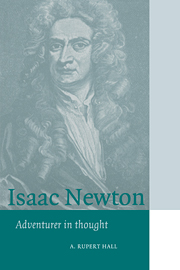Book contents
- Frontmatter
- Contents
- List of Figures
- General Editor's Preface
- Foreword
- Acknowledgement
- 1 The Hopeful Youth, 1642–1664
- 2 “The prime of my age for invention”, 1664–1667
- 3 Widening Horizons, 1667–1669
- 4 The Professor of Mathematics, 1669–1673
- 5 Publication and Polemic, 1672–1678
- 6 Life in Cambridge, 1675–1685
- 7 The Chemical Philosopher, 1669–1695
- 8 The Mathematical Principles of Natural Philosophy, 1679–1687
- 9 Private and Public life, 1685–1696
- 10 Fluxions and Fury, 1677–1712
- 11 Opticks, or a Treatise of Light, 1687–1704
- 12 Life in London, 1696–1718
- 13 A Man of Authority and Learning, 1692–1727
- 14 Later Books, 1706–1726
- 15 Kensington, 1725–1727
- Appendices
- Notes
- Bibliography
- Index
8 - The Mathematical Principles of Natural Philosophy, 1679–1687
Published online by Cambridge University Press: 12 January 2010
- Frontmatter
- Contents
- List of Figures
- General Editor's Preface
- Foreword
- Acknowledgement
- 1 The Hopeful Youth, 1642–1664
- 2 “The prime of my age for invention”, 1664–1667
- 3 Widening Horizons, 1667–1669
- 4 The Professor of Mathematics, 1669–1673
- 5 Publication and Polemic, 1672–1678
- 6 Life in Cambridge, 1675–1685
- 7 The Chemical Philosopher, 1669–1695
- 8 The Mathematical Principles of Natural Philosophy, 1679–1687
- 9 Private and Public life, 1685–1696
- 10 Fluxions and Fury, 1677–1712
- 11 Opticks, or a Treatise of Light, 1687–1704
- 12 Life in London, 1696–1718
- 13 A Man of Authority and Learning, 1692–1727
- 14 Later Books, 1706–1726
- 15 Kensington, 1725–1727
- Appendices
- Notes
- Bibliography
- Index
Summary
Hooke and Newton, 1679–80
Recently D. T. Whiteside has published an authoritative article on the evolution of the Principia from 1664 to 1686, following hard upon a large volume of facsimiles of the relevant documents. My account here, therefore, may be confined to bare essentials, especially as so little is known of Newton's personal life in the period of most intense effort devoted to his great work, that is, from the summer of 1684 to the late spring of 1686, when his surviving correspondence with Edmond Halley opens. Of the dozen extant letters from this period of some twenty-six months, no fewer than nine concern Flamsteed's putative provision of astronomical data for use in the Principia.
We must go back to chapter 6, where we left Robert Hooke enticing Newton (against his desire) into a philosophical correspondence. In a rejoinder of 9 December Hooke returned to Newton's carelessly considered spiral of descent, ending at the centre of the globe, as sketched in his letter to Hooke of 28 November 1679 (see figure 6.1). Regretting Newton's renunciation of philosophy as ‘a little Unkind’ and disclosing that he had read Newton's reply to his first approach at a meeting of the Royal Society, Hooke agreed, as had other Fellows then present, that a weight would fall to the east of its point of departure, not the west.
- Type
- Chapter
- Information
- Isaac NewtonAdventurer in Thought, pp. 202 - 224Publisher: Cambridge University PressPrint publication year: 1996
- 1
- Cited by



